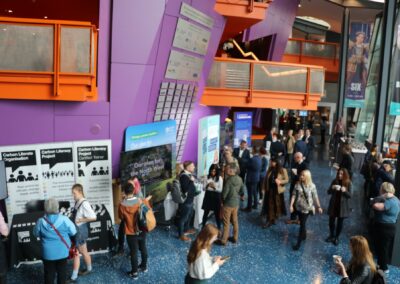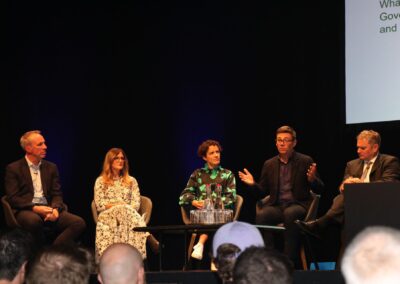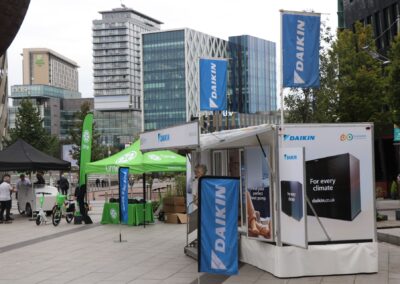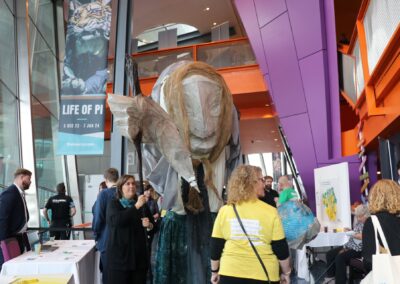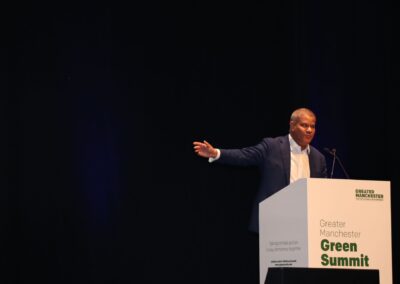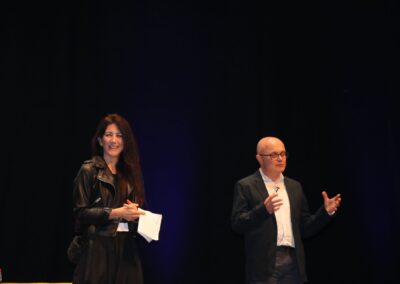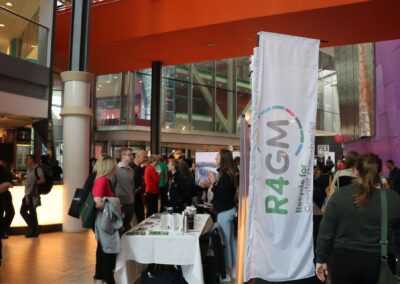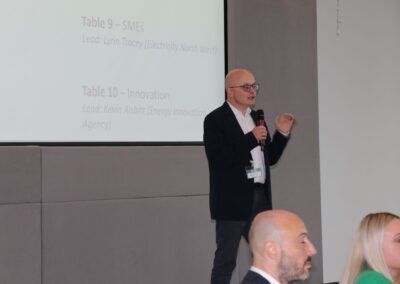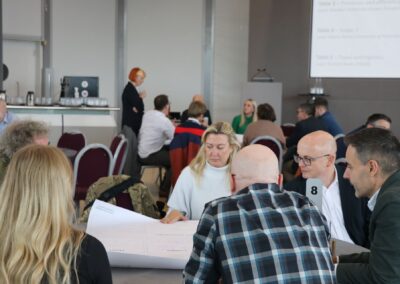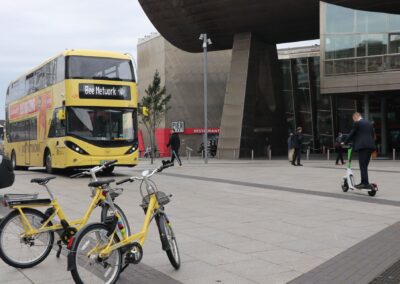Monday 2nd October marked the 6th annual GM Green Summit, an event which aims to accelerate climate action across the region. By bringing people from all walks of life across Greater Manchester who are determined to drive change and help the city-region meet its ambitious goals for the environment, the event hopes to find solutions to the biggest challenge facing our generation.
Local authority leaders, businesses, community groups, schools and individuals came together at The Lowry Theatre in Salford Quays. The day included panel sessions, workshops and exhibitions from local businesses and initiatives, aiming to raise awareness for net zero and low carbon solutions. This included a push for The Bee Network, Green Economy and the support available from Electricity North West, The Growth Company and other Greater Manchester organisations and initiatives.
The conference made it clear that Greater Manchester’s outlook on climate action remains positive, despite a turbulent climate and negative news around climate change. The region is putting lots of measures in place to support the transition to net zero and to meet its goal of being zero carbon by 2038.
To open the summit Cllr Tom Ross Leader of Trafford Council and Green City-Region Portfolio Lead at Greater Manchester Combined Authority said “It is clear that there is far more to do but in Greater Manchester, we’re making good progress across the board. The next step is to increase the speed and scale of delivery. To achieve our 2038 target we will need coordinated partnerships between local and national government, universities, communities and more.
To work together to address these issues is something we can all do and together, we can make a difference. By working together we are making a cleaner, greener, fairer city region.”
Throughout the day, Andy Burnham made the region’s stance on climate change clear. He said, “It’s our job to set the strategic direction for the city region as well as putting in schemes to deliver that. I want to make something really clear, we’re not changing our stance on net zero. We are sticking to our path to becoming a 2038 net zero city region. It represents the best opportunity for our region to reindustrialise.”
The Mayor also discussed the colossal challenge that lies ahead of the region in fixing the green skills gap, praising technical education reform across the way as one of the biggest opportunities our region faces. It’s important that Greater Manchester is ahead of the game on green skills but also in driving innovation and behaviour change around green jobs and upskilling.
He also discussed the Bee Network and the region’s dedication to creating an affordable, integrated public transport system that will benefit everyone.
Later that afternoon Sir Alok Sharma, Conservative MP and former President of COP 26 gave a keynote address to the summit.
He said, “You’re doing exactly what needs to happen, bringing together businesses, civic society and local government as well. It is the right approach because we all have a role to play in reaching a net zero society. Summits like this are a great opportunity to bring people together to drive action.
“It is human activity that is causing global warming and that’s why it is up to us to deal with this. If we do nothing at all about climate change it could end up costing up to 20% of global GDP a year.
“The future belongs to the next generation and I think it’s vitally important that civil society groups pressure local, regional and national politicians to act. When you make decisions and decide where to invest your money, please think of the voices of young people in civil society ringing in your ear.”
Net Zero for Businesses
The role of businesses in the region’s transition to net zero was front and centre at this year’s GM Green Summit. The Bee Net Zero partnership held a workshop which aimed to help Greater Manchester’s business community to better understand their journey to net zero and the support available to them. In a hands-on workshop the parentship aimed to discover from business leaders what further support would be useful on the journey to net zero so it could inform action going forward.
Then, representatives from the Greater Manchester Business Board (LEP) took to the stage to discuss the role businesses can play in reaching net zero including a wider introduction to the Bee Net Zero partnership.
Steve Connor Green Lead for the Greater Manchester Business Board said “This transition for businesses is really critical. We started the industrial revolution, if we can pull off the green revolution nowhere can say it’s too difficult. Getting to net zero will give a 6.4% boost to GDP for the nation. Net zero is not a cost, that’s a lie that’s being spread at the moment, it’s an opportunity.
“The Bee Net Zero partnership is going from strength to strength, we’re about to launch a commitment so we can track businesses across Greater Manchester and where they are on their net zero journey as well as work on sector-specific support.”
Lou Cordwell, Chair of the GM Business Board said “Business has got a really important part to play in Greater Manchester’s transition to net zero. One thing I think is really apparent is something that we see on a weekly basis, internationally significant businesses that want to help us. We’re surrounded by people inspired by our purpose. We remain really passionate about the role of business and business working hand in hand with government, academic institutions and civic society.”
Mayor of Greater Manchester Andy Burnham joined a Q&A with some of the summit’s key sponsors Untied Utilities, SSE Energy Solutions, British Gas, Autotrader UK, Deikin and Electricity North West to uncover what these organisations were doing to reach net zero targets.
It also provided an opportunity to shine a light on carbon literacy training and what it means for organisations, awarding two Greater Manchester professionals Carbon Literacy Catalyst Awards for their progressive work in training their organisation.
The rest of the summit gave a voice to other groups including young people, faith groups and community groups. Workshops covered topics like food waste, water management, nature recovery, sustainable electric cars and more to help local people take steps towards net zero.
A core part of this year’s GM Green Summit however, aimed to provide a first look region’s next five-year environment plan for 2024 – 2029 covering natural environment, transport, low carbon, sustainable consumption and adaptation to climate change. The chairs of the current green challenge groups, created to accelerate action against different areas of the Greater Manchester Environment Plan took to the stage to discuss achievements so far.
To learn more about the Greater Manchester green summit, visit the GM Green City website.
Learn more about how Bee Net Zero can support your business on the journey to net zero, here

